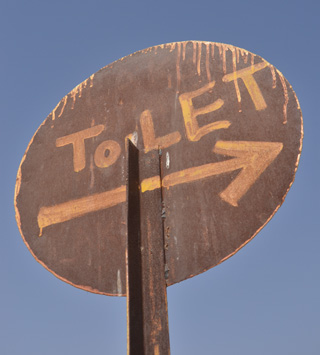What is Traveler's Diarrhea?
 Traveler's Diarrhea is a broad term for diarrhea contracted while traveling, most often associated with consuming contaminated foods or drink. This general definition could cover international, domestic or even local travel (to a neighborhood restaurant, for example).
Traveler's Diarrhea is a broad term for diarrhea contracted while traveling, most often associated with consuming contaminated foods or drink. This general definition could cover international, domestic or even local travel (to a neighborhood restaurant, for example).
Because remedies are readily available in the developed work, some may not take the illness seriously. But travelers at home, abroad or around the block need to be wary of the affliction at all times. Diarrhea can cause severe dehydration, which can kick off a host of other health concerns.
Traveler's Diarrhea: Prevention
As Vincent Zandri points out in his Living Ready University Online Course, Travel Safely Outside the Country, there are some common sense ways to avoid Traveler's Diarrhea no matter the location.
Zandri recommends avoiding ice from questionable establishments, watching for tap water being sold as bottled water and carrying a portable sterilizer, such as a SteriPen.
On the food front, Zandri says to trust your nose. If it doesn't look good to begin with, don't eat it. Remember that restaurants might serve food that looks safe, but the conditions in the kitchen could be appalling. Food served hot usually offers the best odds of a safe meal.
As a rule of thumb, remember the old traveler's rule of “boil it, cook it, peel it or forget it” when it comes to food.
Traveler's Diarrhea: The Disturbing Fact
Even if all the advice in Travel Safely Outside the Country is followed, that still might not be enough to prevent Traveler's Diarrhea. Here's why, according to information from the Centers for Disease Control and Prevention (CDC) found in the Living Ready University Online Course.
The earliest study that addressed the question of food and water precautions was published in 1973; it concluded that “drinking bottled liquids, and avoiding salads, raw vegetables, and unpeeled fruits failed to prevent illness.” In a study of returning travelers from Mexico and Peru published in 1978, in which >70% of travelers reported TD, the author noted that “avoidance of tap water, uncooked foods, and ice cubes did not make a difference in the outcome.”
In a famous study in 1983, a survey of over 10,000 travelers worldwide found not only that observing food and water precautions failed to prevent TD, but also that people who claimed that they exercised more caution were at increased risk of acquiring TD: “Diarrhea seemed to occur more frequently the more a person tried to elude it!”
That's right. Just by virtue of traveling outside your regular area (in or out of the country), your odds of contracting Traveler's Diarrhea go way up. So what can you do about it?
Traveler's Diarrhea: It's Not What, But Where
The CDC goes on to state that it's not what you eat or drink, but where you consume it that makes the difference. This is because food preparation conditions can vary.
From the CDC:
Some restaurants fail to provide sinks for employees to wash their hands after going to the toilet. Cutting boards may not be washed between cutting raw meat and peeling and cutting vegetables. Foods are cooked but then may be left to sit at ambient temperatures for extended periods of time because of a paucity of refrigerator space or power cuts.
Windows may not be screened to keep out flies. Defrosting meat can sit on a refrigerator shelf and drip juices on already cooked foods.
Again, this could happen while traveling in or out of the country. On your home turf, you know the best places to get safe food and drink. Away from home you don't. Your odds of Traveler's Diarrhea go up.
Traveler's Diarrhea: The New Rule of Thumb
That doesn't mean you should abandon common advice about Traveler's Diarrhea. Avoid tap water, eat cooked foods, etc. But the new rule of thumb is to either prepare the food yourself or to find out if where you are eating is truly offering safe food and drink.

![Best Concealed Carry Guns In 2025 [Field Tested] Wilson Combat EDC X9S 1](https://gundigest.com/wp-content/uploads/Wilson-Combat-EDC-X9S-1-324x160.jpg)


![Best 9mm Carbine: Affordable PCCs [Tested] Ruger Carbine Shooting](https://gundigest.com/wp-content/uploads/Ruger-Carbine-Shooting-100x70.jpg)
![Best AR-15: Top Options Available Today [Field Tested] Harrington and Richardson PSA XM177E2 feature](https://gundigest.com/wp-content/uploads/Harrington-and-Richardson-PSA-XM177E2-feature-100x70.jpg)
